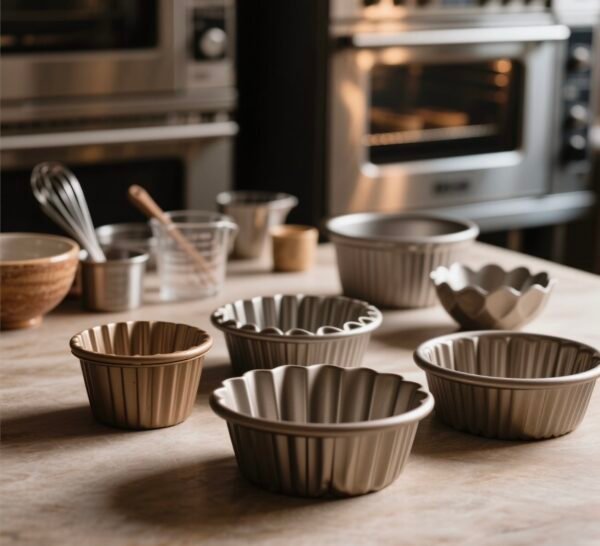When you slide cookie dough onto a baking tray or pour fluffy chiffon cake batter into a mold, your focus is probably on achieving that perfect golden crust. But have you ever thought about what’s really happening on the surface of your bakeware between uses?
In today’s post, we uncover how inorganic antimicrobial agents are quietly transforming bakeware materials, making your baking experience not only delicious but also more hygienic.
The Hidden Problem: Is Your Bakeware Truly Clean?
Let’s face it – baking molds and trays are not always cleaned immediately after use. Sometimes residue remains overnight, especially if baked goods stick stubbornly. Over time, this:
- Encourages bacterial buildup in scratches or micro-grooves.
- Causes lingering odors that affect the taste of future bakes.
- Potentially transfers microbes to food, especially when molds are stored for long periods in humid kitchens.
Traditional cleaning and high-temperature baking kill most microbes. However, between washes and uses, surfaces are still exposed to ambient bacteria. This is where antimicrobial-enhanced bakeware steps in.
What Are Antimicrobial Agents in Bakeware?
In bakeware production, inorganic antimicrobial agents refer to metal-based compounds such as:
These agents can be integrated into:
- Non-stick coatings (common in metal molds)
- Silicone bakeware matrices
- Plastic bakeware handles or accessories
Once embedded, they provide a continuous antibacterial effect, reducing microbial load on surfaces between uses.
📌 Story from a Home Baker
“I love baking cupcakes for my kids, but silicone molds sometimes develop a faint smell over time, no matter how thoroughly I wash them. Since switching to antimicrobial silicone molds, I’ve noticed no lingering odors and feel more at ease making no-bake desserts with them too.”
How Do These Inorganic Antimicrobial Agents Work?
The process is elegantly simple yet scientifically powerful:
- Ion Release
The embedded silver, copper, or zinc ions slowly migrate to - Disruption of Bacterial Membranes
These ions interact with bacterial cell walls, disrupting their integrity. - Interference with Metabolism and Replication
Metal ions bind to bacterial enzymes, halting essential metabolic pathways and preventing further replication.
The result? Bacteria landing on the surface fail to thrive, keeping your bakeware significantly more hygienic.
❓ Frequently Asked Questions
Q1. Will baking temperatures destroy the antimicrobial agents?
No. Inorganic antimicrobial agents are heat-stable. They remain effective even after exposure to oven temperatures used in normal baking (up to ~250°C for most household bakeware).
Q2. Is it safe for food contact?
Yes. Silver, copper, and zinc-based antimicrobial additives used in bakeware are regulated under food contact safety standards such as:
- US FDA CFR Title 21
- EU Framework Regulation (EC) No 1935/2004
They are incorporated in such a way that their controlled ion release remains within safe limits, with no harmful leaching into food.
Q3. Do I still need to wash antimicrobial bakeware?
Absolutely. Antimicrobial bakeware reduces microbial growth between uses, but it does not replace normal cleaning. Regular washing ensures removal of visible food residues and enhances the overall hygiene performance of the antimicrobial agents.
Benefits Beyond Hygiene
✅ Odor Control
By inhibiting bacterial growth, antimicrobial agents help prevent odors that can transfer to baked goods, especially in silicone molds often prone to smell retention.
✅ Maintaining Bakeware Appearance
Microbial degradation can cause staining or surface dullness over time. Antimicrobial protection keeps molds looking clean and new for longer.
✅ Peace of Mind
For bakeries, cafes, and home bakers, knowing your tools remain hygienic between uses adds confidence to every batch produced.
The Science Behind Inorganic Antimicrobial Choice
While organic antimicrobial additives exist, inorganic agents are preferred for bakeware due to:
- Thermal stability: Organic agents often degrade at high baking temperatures.
- Non-volatility: Metals do not emit fumes or odors upon heating.
- Long-lasting efficacy: Metal ions continue working for the product’s lifespan.
Real-World Applications
🥣 1. Professional Bakeries
Large-scale bakeries often have short washing cycles between production batches. Antimicrobial bakeware adds an extra safety layer during high-frequency use.
🧁 2. Home Baking Enthusiasts
From silicone cupcake molds to donut pans, antimicrobial-enhanced bakeware ensures hygiene without compromising non-stick performance.
🍰 3. Specialty Molds for Cheesecakes and No-Bake Desserts
No-bake recipes rely heavily on clean, odor-free molds. Antimicrobial properties prevent bacterial odor development even when molds are stored for months.
Safety and Sustainability Considerations
Inorganic antimicrobial agents not only keep users safe but also:
- Reduce chemical cleaning needs: Less reliance on harsh cleaning chemicals benefits both health and environment.
- Last the entire product life cycle: Their effectiveness does not wear off with washing or heating, minimizing waste from premature disposal.
Looking Ahead: Innovation in Bakeware Hygiene
Leading bakeware manufacturers are now:
- Combining silver and copper ions for broader antimicrobial action.
- Integrating agents into colorful silicone molds without altering appearance.
- Developing eco-friendly antimicrobial solutions aligned with sustainable baking trends.
Final Thoughts
Baking is an art and a science. While recipe precision and oven temperature matter, hygiene remains the invisible ingredient that ensures safe and delicious results.
By choosing bakeware enhanced with inorganic antimicrobial agents, you can protect your creations, your tools, and your health – ensuring every loaf, tart, or muffin is made with confidence and care.
✉️ Interested in Enhancing Your Bakeware Products?
We provide customized antimicrobial solutions suitable for bakeware manufacturers worldwide. Contact us to explore how our advanced agents can elevate your products’ hygiene performance while retaining safety, durability, and design flexibility.


-300x210.jpg)
